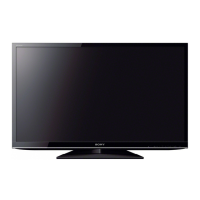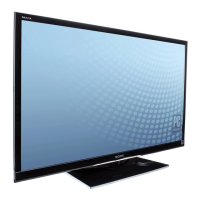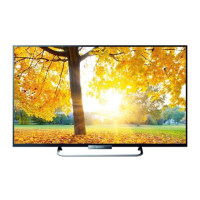Do you have a question about the Sony Bravia KDL-42EX410 and is the answer not in the manual?
Details regarding the BS1363 plug and fuse requirements for UK users.
Welcome advice and information on Digital TV (DVB-T/C) compatibility.
Lists registered trademarks and logos associated with the product.
Lists all accessories provided with the TV, including screws, stand parts, and remote.
Step-by-step guide for attaching the table-top stand to the TV set.
Instructions for connecting aerial, cable, VCR, and DVD recorders using SCART or HDMI.
Safety instructions for securing the TV to prevent it from falling, specifically for certain models.
Guidance on how to organize and bundle cables neatly for a tidy setup.
Guide to selecting the initial language, country/region, and location settings for the TV.
Procedure for automatically scanning and tuning available digital and analogue TV channels.
Instructions on how to adjust the viewing angle of the TV for optimal positioning.
Steps for safely removing the TV's table-top stand, usually for wall mounting.
Guidelines for safe installation, including wall mounting, socket access, and handling precautions.
Information on proper ventilation, mains cord safety, and prohibited usage conditions.
Warnings against unsafe locations, usage conditions, and cleaning methods to prevent hazards.
Safety advice on handling broken parts, usage when not in use, child safety, and general warnings.
Guidelines for viewing, LCD care, battery handling, and disposal of electronic waste.
Explains the function of power, input selection, channel, and volume buttons on the remote.
Details on buttons for accessing menus, options, and special functions like Audio and Text.
Covers functions like Return, GUIDE/EPG, Screen Mode, Digital/Analogue modes, and BRAVIA Sync control.
Explains the function of physical buttons located on the TV set itself.
Describes the meaning of various indicator lights, such as power and standby status.
Steps to power on the TV and select channels using number buttons or PROG/CH.
How to toggle between digital and analogue TV reception modes.
Explanation of icons displayed on the digital channel information banner.
How to access Teletext services and select optimized picture/sound modes.
How to manually change the screen aspect ratio for various broadcast formats.
Instructions on how to access and navigate the EPG to view programme schedules.
How to watch a programme or turn off the EPG display from the guide.
Steps to create, add/remove channels, and manage your personalized favourite channel lists.
How to select and watch channels from your previously saved favourite lists.
Diagram and explanation of ports for connecting external devices like DVD players, cameras, and audio systems.
Information on connecting CAM modules for pay TV and USB devices for storage.
Steps to select and view pictures, music, or video from connected equipment like VCRs, PCs, or cameras.
How to play photo, music, and video files stored on a USB device connected to the TV.
Details on basic playback operations, adjusting video settings, and creating photo slideshows.
Lists the video, music, and photo file formats supported by the TV for USB playback.
Explains how BRAVIA Sync enables communication and control between compatible HDMI devices.
Guidance on configuring HDMI control settings on both the TV and connected equipment.
How to press the HOME button to open the main menu and access various features.
Description of the different media categories available in the menu, such as Favourites, EPG, Photo, Music, Video, and Settings.
Options for adjusting Picture Mode, Brightness, Contrast, Colour, Sharpness, and Hue for optimal viewing.
How to use Noise Reduction and MPEG Noise Reduction features to improve picture quality.
Adjusting Film Mode, advanced contrast, gamma, and colour settings for picture enhancement.
Configuring sound modes like Dynamic, Standard, Clear Voice, and using the equalizer for audio tuning.
Adjusting surround sound, bass, dual sound, speaker output, and audio source selection.
Changing screen format, auto format, display area, and shifting picture position.
Customizes the TV screen to function as a PC monitor, including auto adjustment and screen format settings.
Procedures for analogue auto tuning, manual channel presets, and configuring TV system settings.
Assigning labels to channels, fine-tuning reception with AFT, and managing audio filters.
Instructions for digital auto tuning and editing programme lists for digital channels.
Configuring subtitle preferences, audio types, system updates, and time zone settings.
Instructions for setting up a new PIN code or changing an existing one for parental controls.
How to lock or unlock individual programmes and external input sources.
Configuring automatic USB media display, sleep timer, and language selection preferences.
Assigning names to AV inputs and configuring HDMI control settings for connected devices.
Managing DivX registration, updating system software, and resetting all settings to factory defaults.
Adjusting power saving modes, idle TV standby, light sensor, and PC power management for efficiency.
Instructions and recommendations for installing the optional wall-mount bracket for secure TV mounting.
Tables detailing the dimensions and screw locations required for installing wall mounts SU-WL100 and SU-WL500.
Diagrams and tables showing specific screw and hook positions for different TV models with wall mounts.
Details on panel system, TV system, colour system, channel coverage, and I/O port specifications.
Details on power consumption, display resolution, physical dimensions, and weight of the TV.
Reference chart detailing compatible PC input signals, resolutions, and frequencies for PC IN and HDMI IN.
Steps to diagnose and resolve issues when the TV does not power on or the standby indicator flashes red.
Solutions for common issues like no picture, no sound, distorted images, ghosting, and noise.
Guidance on resolving problems with selecting channels, blank channels, or digital channels not displaying.
Addressing problems with the remote control, HDMI device detection, and general operation.
Explains how your new TV's digital tuner is ready for Freeview and potential re-tuning needs.
Detailed instructions on how to re-tune the TV channels through the setup menu during digital switchover.
| Screen Size | 42 inches |
|---|---|
| Display Type | LCD |
| Backlight Type | LED |
| Refresh Rate | 60 Hz |
| HDMI Ports | 4 |
| USB Ports | 2 |
| Smart TV | No |
| Built-in Wi-Fi | No |
| Resolution | 1920 x 1080 |











